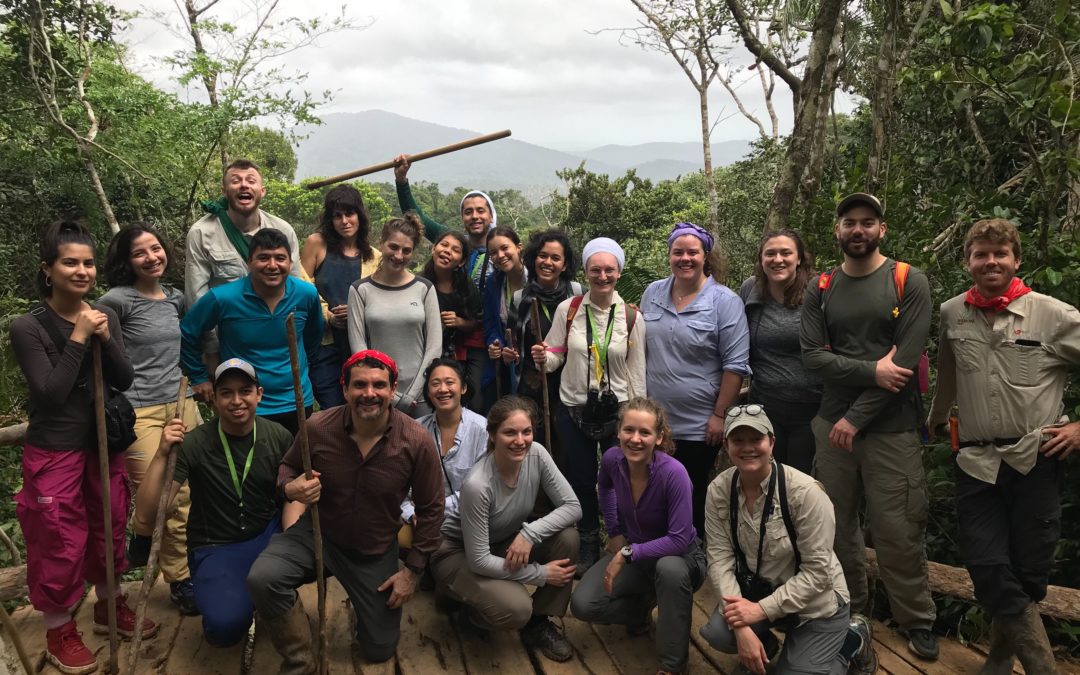The Biomimicry Institute’s Entrepreneurship Director Jared Yarnall-Schane tells his story of leading the Biomimicry Launchpad Entrepreneurship Expedition in Panama in February 2020. Journey with him as he shines a light on the strategies and experiences felt by participants.
Earlier this month, we led a life-changing program deep in the jungle of Panama. 35 young entrepreneurs came together to participate in the first Biomimicry Launchpad Entrepreneurship Expedition, a program designed to challenge these changemakers to view the role of their startup in a different light. We wanted to help them realize that by creating a new organization and solution, they could directly impact our global home, Earth.
We need a seismic shift in how we conduct business. I can’t help but wonder how our current environmental crisis may look different if entrepreneurs and executives spent less time in boardroom meetings and more time having deep conversations in nature.
Growing up, my father ran a summer camp located on a pristine 750 acres. Being outside was my normal, and it was normal for me to camp out under the stars. As I grew older, I became a camp counselor, and one of my favorite activities was to take my group outside at night to look for shooting stars. For many this was the first time they saw the Milky Way, and it opened up so many questions about why we are here and how amazing our planet is.
Now after starting several companies and helping hundreds of others get their start, I have found my work coming full circle. It is time that we start looking at a company’s connection to nature in the same way we look at their bookkeeping or strategic planning.
To do this, we had three goals for the Entrepreneurship Expedition in Panama. Reconnect to nature, build a life-long community of biomimicry innovators, and help these entrepreneurs figure out the next steps for their business. Below are the strategies and experiences felt by our participants, and we are sharing them here in the hopes you can bring them into your own organization as well. You can learn more about the Launchpad program, and read about the participating startups, on our website.
Reconnect to Nature
Designers and entrepreneurs seem to spend most of their time sitting in front of their computer screens. Part of our biomimicry ethos is to flip the script, and spend time doing our work out in nature. There is no better way to understand the human impacts of our companies and products than by directly visiting some of the most biodiverse sites in the world. To accomplish this, we partnered with Experience Mamoní, a 12,900 acre land conservancy that contains a mixture of tropical primary rainforest, advanced secondary forest, natural regeneration, plantations of native and exotic timber trees, and a patchwork of large pastures with areas of slash and burn agriculture.
In Mamoní, we went on a naturalist guided hike through the rainforest to the continental divide, as well as a guided night hike along a small jungle stream. We were awe-inspired by the pristine nature and had some moments of deep self-awareness while staring eye to eye with a bullet ant!
As we were departing the Mamoní Valley, moving from the primary forest into clear-cut pastures and then back to Panama City, I couldn’t help but think that any organization that wishes to champion environmental issues must prioritize time for their employees to work outside. When we live in cities and work in front of screens, we forget that nature is always evolving and solving complex challenges. Perhaps we need to focus on understanding (and learning from) nature as much as we focus on understanding (and learning from) our customers. It helps us remember that we’re all connected, that we all call Earth our home.
Building Community
Choosing the life of an environmental entrepreneur can be lonely. This is why we decided to make a concerted effort to build community while together in Panama. Just like how nature does not work in silos, startups can not work in isolation. They need a community of peers to support and challenge them as they continue to evolve as a company.
In Mamoní, there was minimal internet connectivity, allowing us all to be fully present in the moment. We shared meals family style and slept in tents next to each other on large, elevated platforms. This led to a plethora of shared stories and conversations, and I often found myself lingering with others around the campfire, fully immersed in learning about someone else’s life story.
We also took part in friendly challenges, such as building and racing bamboo boats, to instill a sense of play and competition. In the afternoons we came together to support each other’s businesses by providing feedback on pitches, and sharing relevant experiences. Perhaps most importantly, there was a sense of belonging and trust that allowed us all to embrace our most authentic self, and push past boundaries that may limit potential. I heard from many participants that this was the first time they felt like they belonged to a community, and that they wanted to find or create this same feeling when they returned home.
To help them (and you!) build an intentional community, I wrote down 7 strategies on how to build communities, which you can read on Medium.
Startup Next Steps
Our last goal for the Expedition was to help the startups understand how to continue developing their company. While sitting under a beautiful bamboo structure, we learned from Dr. Tamsin Woolley-Barker (author of TEEMING: How Superorganisms Work Together to Build Infinite Wealth on a Finite Planet) about how to build a culture of collaboration and support in our organizations. Colonies of bees and ants make collectively brilliant decisions by tirelessly gathering information. In a similar way, startups need to collect useful information about their potential customers and prototypes in order to minimize their risk and make informed decisions. As a founder or executive, it is your job to build a culture that supports this mindset by implementing simple rules that every employee (including you) follows.
Participants also took part in rigourous pitch training to help our startups refine their business models and effectively communicate their stories. We started this activity by coming together in a circle, where everyone had to give a 1-minute elevator pitch. By ensuring that every person had an opportunity to speak, some co-founders found disconnect amongst themselves, while others gained the confidence to speak in front of a group of strangers. By working through their pitches together, teams began to organically share ideas, connections, and concerns with each other. This was only possible because everyone felt empowered and supported to take risks, while trusting their peers would listen deeply to their feedback.
Another lesson came while we were hiking in the jungle. Our naturalist guide Lider Sucre brought us to a place where a giant tree fell and created a clearing in the undergrowth. He put forth an analogy that has been running circles around my head. When a tree falls in the jungle, it is a tragic loss, but also provides an opportunity for hundreds if not thousands of other species to thrive. There will be a transition period where species fight for resources, but eventually a new tree (or sometimes several) will take its place. I can’t help but feel that we are in that time of transition. As multi-nationals continue to consolidate and face pressure from the public about their harmful environmental business practices, and at a time when ‘business as usual’ has paused with the COVID-19 pandemic, startups wait in the undergrowth for an opening to appear so they can reshape the local area.
Our goal is to prepare the startups that will fill the void, ensuring that we create companies that benefit our entire planet, not just one species.
Read Part II of this article where Program Manager Michelle Graves share her unique perspective on the power of context and connectivity here.
—
Startups in the 2019-20 Biomimicry Launchpad cohort are addressing problems ranging from micro-plastic pollution, to sunny-day flooding, to novel food preservation techniques. You can read about all of the participants, and learn more about the program here.
 Jared Yarnall-Schane is the Entrepreneurship Director for the Biomimicry Institute. Jared brings his entrepreneurial background & startup coaching experience to the Biomimicry Institute to lead the LaunchPad program, with a goal of commercializing biomimicry innovations.
Jared Yarnall-Schane is the Entrepreneurship Director for the Biomimicry Institute. Jared brings his entrepreneurial background & startup coaching experience to the Biomimicry Institute to lead the LaunchPad program, with a goal of commercializing biomimicry innovations.
Read more about Jared and the Biomimicry Institute team here.

